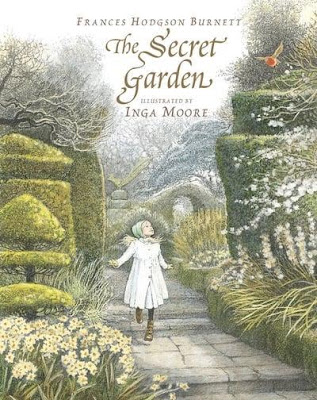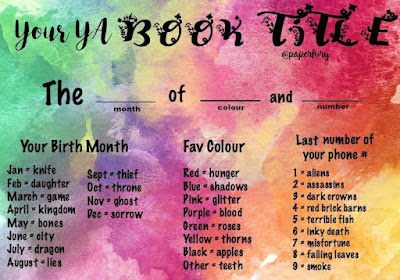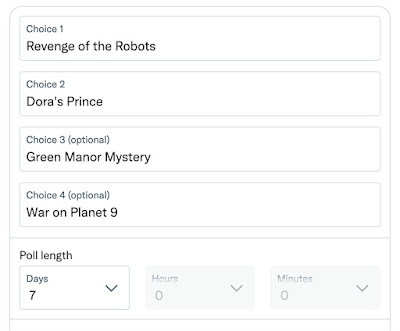WRITING What to Name Your Book
You’ve worked hard to make the first paragraph of your book memorable. And that first chapter.
A potential reader (or the parent of one) is browsing in a bookshop. How will they choose your book over another? Bookshop browsers look first at the cover art and the title. If you’re lucky, the cover will be on display, on a table or face out. But… for most writers most of the time, whose books are shelved the normal way, the title (and author’s name) is all the shopper can see.
Online, the title is the main thing visible. Cover art is reduced to a thumbnail, and there may be a short book blurb and reviews. For a reader who knows nothing about your book, the title is crucial. What’s the use of writing a fantastic book if no one picks it up? (Of course, word of mouth can make a good book with a bad title take off.)
So how do you find a title for this book you are writing, this project that has been such a labour of love?
 |
| The Secret Garden – would it matter if it was called 'Mistress Mary'? |
Many authors have working titles while they’re writing the book, and they’re not always inspired. F. Scott Fitzgerald wanted to call The Great Gatsby ‘Trimalchio in West Egg’. The Secret Garden was almost ‘Mistress Mary’. The Handmaid’s Tale could have been named ‘Offred’. Treasure Island was 'The Sea Cook'. Sometimes titles are imposed by the publisher, who often has a better idea of what will sell. The fact is, if you don’t come up with a great title for your own book, your publisher will make the decision, sometimes by committee. That should be enough incentive to try to come up with a good one! No one cares as much about your title as you do.
 |
| Although this list is for adult fiction, it gives a sense of the trends. From the Towards Data Science blog |
Nonfiction
Although nonfiction book titles need to be clear, you can use a catchy title and make the subtitle convey the information. Good News: Why the World Is Not As Bad as You Think. The Crayon Man: The True Story of the Invention of Crayola Crayons.
To make your book easy to find, use keywords that appear in searches for that subject. The ABCs of Black History.
 |
| Cover of Junko Tabei: One Step At A Time |
Picture books, especially, need a title that works well with the cover illustration. For example, Junko Tabei: One Step at a Time – the picture makes you want to know more about the person in the title.
Funny titles will attract children: President Taft Is Stuck in the Bath.
Picture Books
An unscientific study of the top-selling picture books on Amazon shows that many of them have only two or three words.
Something funny is always good. Don’t Let the Pigeon Drive the Bus!
Set up a conflict. I Want My Hat Back! or The Owl Who Was Afraid of the Dark.
Rhyme can be attractive. Llama Llama Red Pyjama.
Also alliteration. A Squash and a Squeeze.
Don’t give away the ending. eg Arthur Learns to Share.
A single word is all right if it’s memorable. Superworm.
Chapter Books and MG
Funny is good. I Don't Want to Be a Frog.
Wordplay, where one word in a well-known phrase changes. Who Let the Gods Out? or The Meal of Fortune.
Make children curious. A Storm of Sisters, Agatha Oddly: Murder at the Museum.
Longer titles are okay with this age group. Make them memorable. The Worst Class in the World in Danger, Luna Loves World Book Day.
If the concept of the book is already a hook, you can use that: The Time Travelling Shed, The Last Bear.
Pretend to be nonfiction: Loki, a Bad God’s Guide to Being Good, A Good Girl’s Guide to Murder.
Where does the story take place? The Day I Fell into a Fairytale, The Griffin Gate, Princess Academy, The Nameless City.
Who is in it? This can be the main character… or even the villain. The Snow Child, The Boy Who Made the World Disappear.
One word can work well, if it’s memorable. Brightstorm, Windsinger.
 |
| Cover of Noah Can't Even. |
YA and up
"A romance book should not be called Warborn: Battle for Arrakis."
Think about your genre. Will the reader know what kind of book it is from the title? City Spies, Dragon Masters, Throne of Glass, Shadow and Bone
At the same time, try not to get caught by clichés. The single-word title? It has some disadvantages unless it’s a very unusual word. Shattered.
If someone is looking for your book online, will it appear on top? Or on Google page 5 along with all the other books with that word in the title? Try a search for any title you choose.
 |
| Image from the Paperfury blog showing words that appear in too many YA novels. |
The Paperfury blog has a funny list of words that have appeared in too many YA novels. The Glass Bone? Crown of Roses? Ask yourself if you can come up with something a little more original.
"I mean if it doesn’t have 'shadow' or 'queen' or 'bone' in it…
is it REALLY a fantasy book????" – C.G. Drews
Try:
– A phrase from your book.
– A snippet from a relevant quotation.
– The name of a character, if it’s intriguing.
– The main conflict in the story.
– Who, what, where, how, when.
– What problem is being solved in the book?
Come up with lots of titles. Then test them.
A few more things
– Ask people for their opinion – especially people who work in publishing, librarians and booksellers. You can do this on social media if you don’t know anyone in person.
– Try A/B testing to see if people are much more interested in one title than another. PickFu will let you try this for free. You may be astonished at the difference in interest.
 |
| Twitter and other social media allow you to create polls – take advantage of this feature to test titles. |
– Make sure everyone can read and pronounce the title. Think hard about using foreign or invented words unless their pronunciation is obvious. This is important: to avoid embarrassment, many people will not ask for a book whose title they’re not sure about. Also, test the clarity of the title by saying it yourself and asking people to repeat it to you. You may be surprised that they don’t hear it properly.
– Are you going to be happy saying that title five gazillion times as you promote your book? Think about that.
 |
| Google or another search engine can also help you find out if a famous author is writing a book with the same title as yours. |
– Avoid controversial titles – search engines are your friend. Also, check out Urban Dictionary for the words in your choice to see if there are new connotations you might be missing.
– If your book becomes a big success (why not?!), a distinctive title can appear on t-shirts, mugs, even a television show. Could yours?
– A long title can make the cover art more difficult to see and is harder to read from across the aisle. (Will it fit on a cake at your book launch?!) Also, if you want to use the title for a website, it probably needs to be short. Currently the limit is 63 characters for a domain name.
Oh and by the way...
– See if the domain name is available.
– If someone forgets your title, but knows what the book is about, how easy will it be for them to discover it?
Remember, a great title will not only make you proud, it will help your story sell.
*
_____________________________________________________________________________________
Julie Sullivan is a SCBWI volunteer and loves dreaming up titles.
____________________________________________________________________________










I needed help deciding on a title. Your article has given me clarity. Thank you.
ReplyDeleteThe King & The Goddess
ReplyDeletecant figure out a title but this has helped a bit.
ReplyDeleteThe book/name thing for the phone number does not have a zero so I cant finish my title. So far I have: The bones of shadows and __________. Oh well.
ReplyDelete